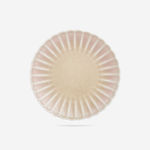House Editions
Petal Plate, Tea
Jingdezhen Porcelain, Glaze
D 15 cm
D 5.9 in
D 5.9 in
Further images
-
(View a larger image of thumbnail 1
)

-
(View a larger image of thumbnail 2
)

-
(View a larger image of thumbnail 3
)

-
(View a larger image of thumbnail 4
)

-
(View a larger image of thumbnail 5
)

-
(View a larger image of thumbnail 6
)

-
(View a larger image of thumbnail 7
)

-
(View a larger image of thumbnail 8
)

-
(View a larger image of thumbnail 9
)

-
(View a larger image of thumbnail 10
)

-
(View a larger image of thumbnail 11
)

The chrysanthemum form can be found as far back as the 10th c. Song dynasty in the ceramic history of China. Rejuvenation, intellectual pursuits, loyalty, perfection, and the sun also find meaning in the chrysanthemum. In China, ancient lore tells of a man who became immortal after drinking dew from its petals, while in Japan, the unfolding of the petals symbolizes perfection and the rays of the sun. Although eating from this dish may not result in immortality, indeed it is a flower and a dish to meditate on.
9
of
9










